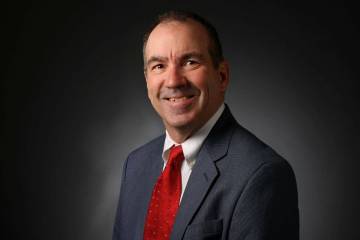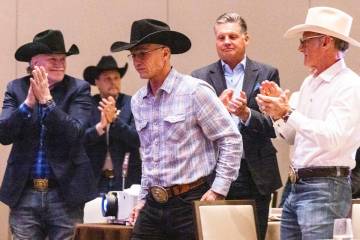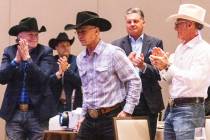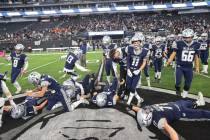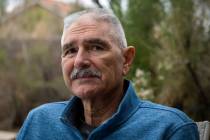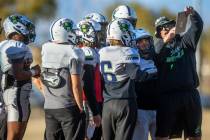‘Moneyball’ bit player Korach likes film … and Howe
Ken Korach's voice can be heard for about 22 seconds in the hit baseball movie "Moneyball," now showing at a theater near you. That's probably not enough to warrant an Oscar nomination, given Anthony Quinn holds the record for shortest amount of time spent on screen as a Best Supporting Actor of eight minutes, as painter Paul Gaugin in 1956's "Lust for Life."
But whereas Brad Pitt only stars in "Moneyball," longtime Las Vegas resident Korach lived the 2002 season as play-by-play broadcaster for the Oakland Athletics, who set an American League record by winning 20 consecutive games.
And though Korach's 45-minute interview about that season wound up on the cutting-room floor -- apparently along with photographs of the real Art Howe, the former A's manager who was nowhere near as rotund (or cantankerous) as Philip Seymour Hoffman made him out to be in the movie -- Korach said director Bennett Miller and the Hollywood people got it right.
Except, perhaps, for the part about Art Howe.
"I wish they had done a more flattering portrayal of Art ... but it's Hollywood," Korach said of "Moneyball," based on author Michael Lewis' 2003 book of the same name. "They wanted to show conflict between Billy and Art."
Billy is Billy Beane, who was general manager of the Athletics then and still is today. Beane is credited with adapting the so-called "Moneyball" approach -- finding value in players based on sabermetric statistical data and analysis, rather than traditional scouting values such as hitting home runs and stealing bases -- to building a ballclub.
The premise, at least for a movie, sounds less interesting than a Royals doubleheader.
But the movie shines, mostly because Pitt is fantastic as Beane, Jonah Hill is fantastic as his sidekick Paul DePodesta (though the character is called Peter Brand in the movie because DePodesta didn't want his name used), and Hoffman is fantastic as Herman Franks, if not Art Howe.
And the guy they found to play David Justice, an actor named Stephen Bishop who played baseball at UC Riverside and then briefly in the low minor leagues, might have a better swing than the real David Justice.
The movie focuses on Beane's failures as a player and on baseball retreads such as Scott Hatteberg and Chad Bradford, the submarine relief pitcher. And on Justice, who by 2002 was 36 years old, supposedly washed up and totally through with Halle Berry.
The movie is not about 2002 A's stalwarts such as pitchers Barry Zito and Tim Hudson and Mark Mulder. It's mostly about Beane, and a new and cheaper way to play the game.
"People say it wasn't a realistic look at what happened that year in terms of identifying the key players," Korach said. "But that's not what they were trying to do."
"Moneyball" is about finding value in unexpected commodities that many small-market organizations espouse today, which might explain why 41-year-old Craig Counsell is still playing for the Brewers. It does not explain why Adam Dunn was allowed to hit .159 for the White Sox this season.
That 2002 season marked the beginning of a trend, in which crusty old baseball men who were educated while sitting on crusty old benches were replaced in the general manager's office by Ivy League types with economics degrees and laptop computers.
Goodbye, Red Man. Hello, Red Bull.
Beane might have stumbled onto something out of necessity in Oakland, but as Korach said, "Moneyball" is based on sound principles that can be applied outside the lines, too.
"In any business, you look for fundamental value where other people haven't found it," said Korach, who recently completed his 16th season in the A's broadcast booth.
Based on the reviews, critics are finding loads of fundamental value in "Moneyball."
It was a boost to Korach's inner deliciousness, as Brian Wilson puts it in those chalupa commercials, to be invited to the premiere at the historic Paramount Theatre in Oakland, to walk the red carpet with the stars and former players, to relive that 20-game winning streak, those calls he had forgotten making with his daughter, Emilee, who is 19 now but was only 10 and mostly missing her dad during the summer of 2002.
Korach said he has seen "Moneyball" twice and plans to see it again.
Even if Philip Seymour Hoffman looks and acts nothing like Art Howe.
Las Vegas Review-Journal columnist Ron Kantowski can be reached at rkantowski@reviewjournal.com or 702-383-0352. Follow him on Twitter: @ronkantowski.




